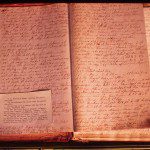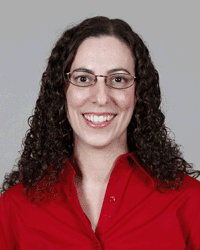
While Tal Howard takes a short hiatus, today we’re happy to share a guest post by Andrea L. Turpin, assistant professor of history at Baylor University. Andrea’s first book, A New Moral Vision: Gender, Religion, and the Changing Purposes of American Higher Education, 1837-1917 “explores how the entrance of women into U.S. colleges and universities shaped changing ideas about the moral and religious purposes of higher education in unexpected ways, and in turn profoundly shaped American culture.” Look for it this fall from Cornell University Press.
I love reading lists. They are always among my favorite blog posts to see pop up on my feed. Given my interests, I follow a number of broadly evangelical blogs and am struck by two features of the reading lists that tend to appear there:
- They’re good. I almost always note several excellent books to add to my queue.
- Men overwhelmingly author the books included. Even on lists by women, although those lists are in general a bit more balanced.
I’m not entirely certain what accounts for this second feature. I doubt excluding female authors is an intentional decision these bloggers are making. Although complementarians and egalitarians disagree on gender roles, both actually agree that men and women have unique perspectives to contribute, and hence we miss out if we don’t read authors of both sexes. I suspect part of the problem is simply cultural: who we know influences what books we are even aware of.
So I have decided to do my small part to remedy this discrepancy between belief and action.
I’ll stick to one of the areas I know best: American Protestant history. I’ve put together a list of eight books in this field that are written by women, published recently (2013–2015), and would be of interest to a broad evangelical readership. I should add that although I am familiar with all of these books, some are on my own summer reading list to sit down with at a more leisurely pace!
I have found that part of what makes a good historian a good historian is the questions she or he asks—the unique way an author approaches a topic. Some of these authors clearly draw on their experience of living in the world as a woman to shape historical questions they might not otherwise have asked; others simply draw on their unique experiences and outlook as an individual person. In all cases, our understanding would be impoverished without their voices.
So, without further ado…
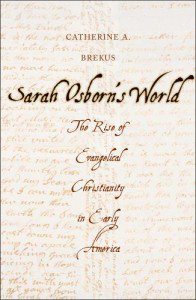 On the First Great Awakening… Catherine Brekus, Sarah Osborn’s World: The Rise of Evangelical Christianity in Early America (Yale, 2013)
On the First Great Awakening… Catherine Brekus, Sarah Osborn’s World: The Rise of Evangelical Christianity in Early America (Yale, 2013)
The bulk of scholarship on the First Great Awakening centers on the lives of its prominent preachers, men like Jonathan Edwards and George Whitefield. Brekus expands our understanding of this critical moment in American religious history by recovering its effects on the life of an ordinary layperson converted during the revivals: Sarah Osborn. Sarah struggled against poverty and illness her whole adult life, recorded her spiritual journey in a memoir and letters, and hosted popular religious meetings in her house—attended by both sexes and by both whites and blacks. Brekus’s moving and sensitive account of Osborn’s life is essential reading for those interested in American revivalism.
On the history of beliefs about Hell… Kathryn Gin Lum, Damned Nation: Hell in America from the Revolution to Reconstruction (Oxford, 2014)
Kathryn Gin Lum uncovers historical precedent for contemporary debates over hell within the evangelical world, most recently the furor produced by Rob Bell’s 2011 Love Wins. She traces how belief in hell remained popular in the United States from the founding through the Civil War—even as that belief declined in Europe—but also how it was contested and changed. Even more critically, she demonstrates how that belief actually mattered, not only to individuals wrestling with their own fate, but also as an impetus to domestic reform movements, foreign missions, and even civil war. Perhaps most strikingly, Gin Lum teases out the way convictions about hell influenced race relations. Drawing on the voices of believers and detractors, ministers and laypeople, Damned Nation shines light on how evangelical debates about the doctrine have had, and arguably still have, a distinctly American hue.
On religion in the Civil War Era… Nancy Koester, Harriet Beecher Stowe: A Spiritual Life (Eerdmans, 2014)
Harriet Beecher Stowe was not only the most published Christian author in the nineteenth-century United States: she was the most published author period. Uncle Tom’s Cabin sold more copies in that century than any book other than the Bible itself, and galvanized the abolitionist movement in the years leading up to the Civil War. Koester’s highly readable biography pays particular attention to the development of Stowe’s spiritual life and its relationship to her anti-slavery activism and other writings. It also portrays her as a very human, and hence relatable, woman. Stowe struggles to find time to fulfill her sense of calling to write amidst the duties of motherhood, and the death of an unsaved son results in a theological struggle with the New England Calvinism she inherited from her famous preacher father Lyman Beecher. Koester illuminates both the religious and political milieu of a nation in flux and the life of an influential woman struggling to live a faithful life in the midst of personal and national change.
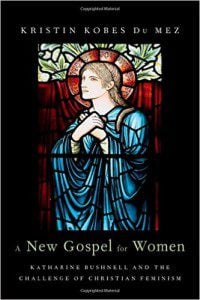 On gender debates in the church… Kristin Kobes Du Mez, A New Gospel for Women: Katharine Bushnell and the Challenge of Christian Feminism (Oxford, 2015)
On gender debates in the church… Kristin Kobes Du Mez, A New Gospel for Women: Katharine Bushnell and the Challenge of Christian Feminism (Oxford, 2015)
This remarkable book recovers the life and work of a largely forgotten Christian theologian, Katharine Bushnell (1855–1946). The reason she has been largely forgotten is that she held together theological and social commitments that have since parted ways: She advocated a conservative biblical hermeneutic in the fundamentalist-modernist debates, believed Scripture in its original languages taught completely egalitarian gender roles, and staunchly held to a traditional Christian sexual ethic for both men and women. Hence, Bushnell was too liberal on gender roles for many modern theological conservatives and too conservative on sexuality for many modern feminists. By demonstrating how Bushnell’s stances arose in the particular culture of the late Victorian Era and then fell out of favor, Du Mez provides meaty food for thought for contemporary evangelicals, both complementarian and egalitarian, who seek to discern where culture may have produced blind spots in biblical interpretation on gender and sexuality.
[Ed. – You’ll soon be hearing more from Kristin right here at The Anxious Bench… Stay tuned!]
On Native American Christianity… Angela Tarango, Choosing the Jesus Way: American Indian Pentecostals and the Fight for the Indigenous Principle (University of North Carolina, 2014)
In this sensitive history of “home missions,” Tarango tells the story of the changing interaction between the Assemblies of God denomination and Native American tribes over the course of the twentieth century. By taking seriously the outlook and actions of Native Americans who converted to Christianity, she counters stereotypes that they were merely dupes of colonialism. Tarango demonstrates how instead Native AG members owned their faith in a distinctly Native way and put pressure on the larger denomination to actually live out their “indigenous principle” of missions by embracing a truly Native-led AG church. Throughout her account, white missionaries emerge in a holistically human way as well, driven many times by racism and paternalism, but also by genuinely self-sacrificial interest in the well-being of Native Americans. Important reading for everyone interested in the thorny problem of the cultural contextualization of the gospel in Christian missions.
On mainline denominations… Elesha Coffman, The Christian Century and the Rise of the Protestant Mainline (Oxford, 2013)
In the wake of countless articles alternately lamenting and praising the decline of “mainline” Protestantism, Coffman delivers a much-needed analysis of the original rise of the mainline, a narrative that also calls into question our assessment of its current state. Specifically, she traces how the widely popular periodical The Christian Century and Charles Clayton Morrison, its editor from 1908 to 1947, helped to forge the idea of a unified Protestant mainline. This mainline consisted of Protestant pastors and intellectuals who embraced modern biblical scholarship, the social gospel, and ecumenism, and claimed to speak for Protestantism as a whole. Its strength was the respect accorded it by American cultural and intellectual elites. Its weakness was that these mainline leaders “too seldom glanced over their shoulders to see if anyone [in the pews] was following them.” Coffman’s nuanced and fair account helps explain why the mainline, now squeezed between evangelicals on the right and a shift to pluralism among cultural elites further left, nevertheless persists and retains influence…and has tacked toward the center.
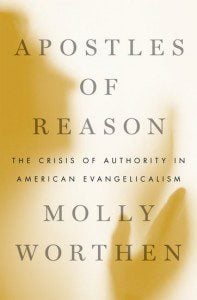 On twentieth-century evangelicals… Molly Worthen, Apostles of Reason: The Crisis of Authority in American Evangelicalism (Oxford, 2014)
On twentieth-century evangelicals… Molly Worthen, Apostles of Reason: The Crisis of Authority in American Evangelicalism (Oxford, 2014)
In one of the most significant recent analyses of modern American evangelicalism, Worthen traces the movement from its neo-evangelical roots, emerging out of fundamentalism in the 1940s, all the way to the present. Her central thesis is that this brand of evangelicalism is defined by its “crisis of authority,” which is to say the difficulty of living out a philosophical commitment to sola scriptura that demands simultaneous reliance on reason and revelation. Written in a striking style rich in colorful metaphors—and at times equally vibrantly rendered judgments—this book may ruffle a few evangelical feathers, but is well worth the time of the reflective reader because Worthen takes “the evangelical mind” seriously, respects its quest, and asks thoughtful and challenging questions about from where evangelicals truly derive their ultimate intellectual authority.
On the Prosperity Gospel… Kate Bowler, Blessed: A History of the American Prosperity Gospel (Oxford, 2013)
The popularity of modern prosperity preachers such as Joel Osteen has a history. Bowler combines analytical rigor with sympathy for her subjects as she traces the rise of prosperity gospel theology in the United States. She asks thoughtful theological questions about how American Protestants have understood the good life and what it means for the gospel to be good news. Bowler demonstrates not only the importance in American life of preachers and congregations that clearly belong to the prosperity movement, but also the much broader influence the movement’s style of thinking has had on other American believers. Essential reading for understanding the outlook of American Protestants today.
This list is by no means exhaustive, so please contribute others to the comments section below!



